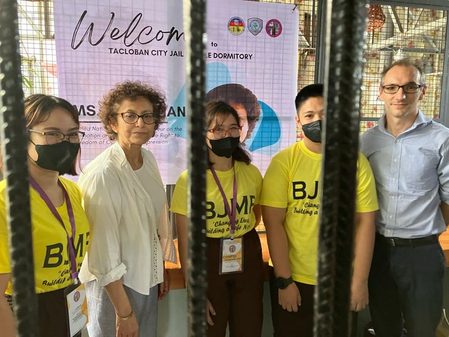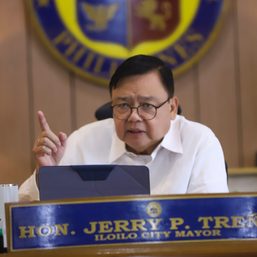SUMMARY
This is AI generated summarization, which may have errors. For context, always refer to the full article.

Gerardo “Gerry” dela Peña jumped from one religion to another. He has worshipped the same God, but in different churches. But he only had one prayer: to be a free man.
On Sunday, June 30, Gerry got his prayer heard and he walked out of the New Bilibid Prison as a free man at 85 years old. He was the country’s oldest political prisoner, detained for almost 12 years.
A combination of campaign efforts plus benefits from much-needed prison reforms in a country plagued by severe overcrowding of jails are what got him out.
Twilight years
Gerry was a land tiller like his parents and was a long-time community organizer in Bicol. In 1982, he was arrested, detained, and tortured by state agents during the dictatorship of Ferdinand E. Marcos. A revision of parole and clemency guidelines under the dictator’s son, Ferdinand Marcos Jr., freed him from detention.
Gerry was a known activist, and was once Camarines Norte chairperson of the rights group Samahan ng Ex-Detainees Laban sa Detensyon at Aresto or SELDA. He was arrested and later convicted of murder in 2013 for incidents that happened in 2009. Gerry said to this day he does not understand his case.
He was 74 when he was arrested in Vinzons, Camarines Norte.
“Nagdusa ako nang halos umabot ng 12 taon na hindi ko alam kung ano’ng kasalanan ko. Ginawaan lang ako ng kaso. Kaya ang kaso ko, hindi murder kundi planting rice, kung naiintindihan nila. Ginawaan nila ako ng hindi ko ginagawang kaso…Lumuha man ako, wala akong magagawa,” Gerry told Rappler in a phone interview.
(I suffered for nearly 12 years without knowing what sin I had allegedly committed. They just filed a trumped-up case against me. That’s why my case is not murder, but rather planting rice, if they understand what that means. They filed a case for a crime I did not commit. Even if I cry, I cannot do anything.)
Activists have long complained that the government across presidencies have restrategized to crack down on them using common crimes like murder, or more often illegal possession of firearms and explosives, instead of political crimes like rebellion. This way, the line that distinguishes between a political prisoner and an ordinary criminal blurs. This is important because those who are recognized as political prisoners can benefit from amnesties that result from peace talks. Those charged with common crimes may be left out.
When Gerry was released on Sunday, the National Security Council was quick to say he was not a political prisoner.
In a phone interview with Rappler, Gerry said he went straight home to Camarines Norte and that he would spend his remaining years making up for lost time with his 81-year-old wife Pilar, their children, and grandchildren.
“Siguro ang pamilya ko na lang [ang aking] paglilingkuran…hanggang sa ako ay magpantay ang paa. Nagpapasalamat ako at sa ilang panahon ng natitirang buhay ko ay nagkasama-sama pa kami ng pamilya ko. (I think I will just serve my family until the day I die. I am really thankful that in my twilight years, I was still reunited with my family).”
He will also try, he said, to help the family’s livelihood by tending to their fishpond and coconut trees.
“Hanggang kakayanin ng lakas ko, magpapaunlad ako (Until my strength allows, I will help in growing our livelihood),” Gerry said.

Fraught process
When Gerry was arrested in 2013, his brother Armenio was also arrested over the same offenses. Armenio did not survive prison life and died in detention after suffering from a heart attack. Gerry, on the other hand, was sentenced to reclusion perpetua for the murder charge, or up to 40 years in prison.
Presidents of the Philippines have the power to grant executive clemency, and they always do in batches for elderly prisoners – usually an open-for-media event meant to send a feel-good message of rehabilitative justice. Clemency comes in different forms like pardon, or totally erasing a criminal record like plunder convict former president Joseph Estrada, who was pardoned by his successor former president Gloria Macapagal-Arroyo; or commutation of sentence for those who have already served time.
Elderly prisoners are usually given clemency by commutation of sentence. This was not an easy procedure for Gerry. In September 2023, Gerry’s application for clemency was denied, according to Fides Lim, spokesperson of the prisoners’ rights group Kapatid.
“In reaction to our persistent lobbying, the BPP [Board of Pardons and Parole] wrote us that on March 8, 2024 they recommended the commutation of Tatay Gerry’s sentence to 12 years, pursuant to that same BPP resolution amending the rules on parole and executive clemency,” said Lim.
She was referring to Resolution No. OT-08-02-2023 of the BPP issued December 2023 by the Department of Justice (DOJ). The old DOJ rules on clemency and parole cover sickly prisoners aged 65 years and above, but exclude heinous crime convicts. Under the law, heinous crimes, include among others, certain cases of rape, murder, robbery, bribery, and plunder.
Under the December 2023 resolution, sickly PDLs (Persons Deprived of Liberty) who are 70 years old and above, even those convicted of heinous crimes, can avail of clemency if they have served at least 10 years of their prison term. That covered Gerry’s case.
For his family, it was the end of years-long depression and anxiety.
“Hindi lang po depression na halos ang umabot sa amin. Kasama na rin po kami sa pagbabanta noon…Halos may mga harassment din pong umabot sa amin noon (It was not only close to depression that almost hit us. We also faced threats. Harassment had reached our family),” Gerry’s son Melchor told Rappler.
Years lost
Melchor said the family lost a father and breadwinner while Gerry was detained for nearly 12 years.
“Unang-una…kakulangan sa pamilya. Dahil kami po, kahit po kami medyo nagkakaedad na, siya pa rin po halos ang nadedesisyon ng tama para sa amin. Pangalawa, ‘yong kalungkutan po, ‘yong kalungkutan at hanapbuhay na nawala sa amin. Dahil hindi lang po siya ang halos nakondena na doon sa pagkakakulong, maging kami man,” Melchor said.
(First, our family was incomplete for years. Even though my siblings and I are all adults, our father still decided correctly for us. Second, sadness and the livelihood we’ve lost. My father was not the only one condemned to prison, but we too.)
In Bilibid, which suffers from a staggering congestion rate of 377% or 30,701 PDLs cramming into a facility meant only for 6,345, Gerry contracted hypertension, diabetes, hyperacidity, and arthritis. On top of that were his poor eyesight and hearing due to old age.
As of June 2024, there are still 755 political prisoners in the country, even if the government does not recognize this number. Of them, 91 are suffering from illnesses, while 102 are elderly. At least 103 of these PDLs were arrested under Marcos Jr.
“We are very happy that Tatay Gerry can finally return home to his family and reunite with his wife Pilar in their twilight years. His release is a milestone for human rights campaigns, but also serves as a stark reminder of the obstacles that impede the release of political prisoners,” Lim said.
Prison reform
The Marcos Jr. administration has showed some attention to prison decongestion. The President’s cousin, House Speaker Martin Romualdez, said during the national decongestion summit that it is a “human rights issue.”
It provides an opening for advocates to push for more prison reforms. For example, it’s high time to have a mechanism to assess which types of offenders should be detained, and which types – especially those who are old and at low risk of committing the same crime – can just be penalized with community service, according to prison reform expert Raymund Narag, who teaches criminology at the Southern Illinois University Carbondale.
Narag, a former PDL himself, said the likes of Gerry could have been punished with community service and put under supervised release. He said these are the best practices in other parts of the world in terms of handling prisoners
“Puwede silang mag-report lang sa barangay. Puwede silang, alam mo ‘yon, i-monitor ng respected member of the community (They can be released and be monitored by reporting in the barangay. They can also be monitored by respected members of the community),” Narag told Rappler.
But these are wishful options for now. – Rappler.com
2 comments
How does this make you feel?







![[OPINION] Power of mimicry: How human rights are covertly undermined in PH](https://www.rappler.com/tachyon/2024/06/duterte-marcos-human-rights.jpg?resize=257%2C257&crop_strategy=attention)


![[WATCH] Silent Tragedy: Epekto ng war on drugs sa mga bilangguan](https://www.rappler.com/tachyon/2024/06/silent-tragedy-tcard.jpg?resize=257%2C257&crop_strategy=attention)





![[Just Saying] A reawakened Supreme Court?](https://www.rappler.com/tachyon/2024/05/reawakened-supreme-court-may-21-2024.jpg?resize=257%2C257&crop=384px%2C0px%2C1080px%2C1080px)
The practice of targeting activists using conventional crimes such as murder, or more commonly, illegal possession of firearms and explosives, rather than political offenses like rebellion, is truly dishonest and unjust. When will our government start treating activists with honesty and fairness?
Definitely they will not do that (with honesty and fairness). As obviously the purpose of these arrests and incredible charges is to sow fear and silence legal, constitutional, and peaceful assemblies to air grievances. And of course state actors specially those in power do not like to be accountable via protest assemblies. It is only critical mass an EDSA 1 like event would change the direction of the wind knowing that these people in power have looted money to spend.